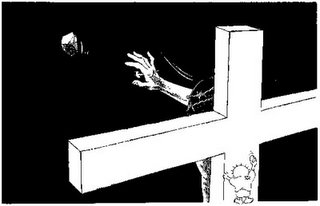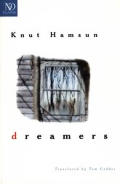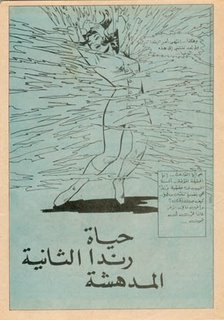Ever since I first heard about the riots against the Muhammad cartoons, I've been shaking my head and wondering about irony. I grew up around Arabic newspapers. I grew up seeing cartoons-- in Arabic, "caricatoor"-- of Jews with massive noses and Americans with razors for hands and tanks for legs; of Western women as greedy whores and Arab women as stupid fat ones. In other words, I witnessed the anger, revolt, and frustrations of a few literally turn images of entire populations into caricatures. And today, I am watching it again. The irony of the cartoon revolts is multi-tiered: there's the Western press caricaturing a prophet. Then, there's an Eastern population reacting in an exaggerated and grotesque manner. Then there's a global press caricaturing their revolt. And it goes on and on.

The whole thing has made me remember my childhood around cartoons, specifically, the first time I saw this cartoon of Jesus throwing a rock in Palestine. The cartoon reminds me of the Danish one because it, too, portrays a prophet engaging in terroristic/violent behavior that is not approved by the powers that be. I know it's not a straight comparison: unlike Muslims, Christians celebrate and surround themselves and/or their places of worship with images of Jesus/crosses. Still, I find it to be close: Representative of a people/Religious Figure commits violent act, a la very few of his followers, in a cartoon.
The man who made this cartoon, Naji el Ali, is greatly admired in the Middle East. He attacked everone in his cartoons: Muslims, Jews and Christians, and as a result, in 1987, was shot by a lone gunman in London as he was leaving the newspaper's office, going home from work. His death is an example of the powers that be silencing the cartoonist, rather than the masses doing so-- there is strong speculation that Arafat ordered the hit.
Today, with the furor around the Danish cartoons surounding me, I wonder: would this cartoon of Jesus have ignited a fury had it been done in a different context: If the West wasn't predominantly Christian, and a Western journalist had made this cartoon, or, if the West were the downtrodden and were in full sympathy of the Palestinian intifada, and a Muslim or Jew or Zoroastrean made this cartoon? What would have been the consequence?
I ask these questions now because, along with ideas about irony, I am preoccupied with ideas of agency. One can't remove the fact of dichotomies of power-- the West is more prosperous and predominantly Christian, the East is poverty stricken, occupied, and Muslim--from the equation of the cartoon revolts. And yet, I can't help but return to the very definition of caricature: literally a pictorial representation, in which the subject's distinctive features or peculiarities are deliberately exaggerated to produce a comic or grotesque effect. And I can't help but think-- both when I read what the cartoon displayed and when I read that 300 Palestinians, out of
millions, set fire to a Danish settlement in "retaliation"-- what a shame that so many will see this photo and buy into this caricature of an entire people.
 From the folks who brought you Words Without Borders, a new anthology of fiction by writers from the Axis of Evil and other enemy countries: Iran, Iraq, North Korea, Cuba, Libya, Syria, and Sudan. The anthology includes stories by Houshang Moradi-Kermani, Muhsin Al-Ramli, Saadi Yousef, Kang Kwi-mi, Salim Barakat, Ibrahim El-Koony (translated by yours truly), Laila Neihoum, Tarek Eltayeb, Anna Lidía, and many others, and you can pre-order your copy today.
From the folks who brought you Words Without Borders, a new anthology of fiction by writers from the Axis of Evil and other enemy countries: Iran, Iraq, North Korea, Cuba, Libya, Syria, and Sudan. The anthology includes stories by Houshang Moradi-Kermani, Muhsin Al-Ramli, Saadi Yousef, Kang Kwi-mi, Salim Barakat, Ibrahim El-Koony (translated by yours truly), Laila Neihoum, Tarek Eltayeb, Anna Lidía, and many others, and you can pre-order your copy today.












